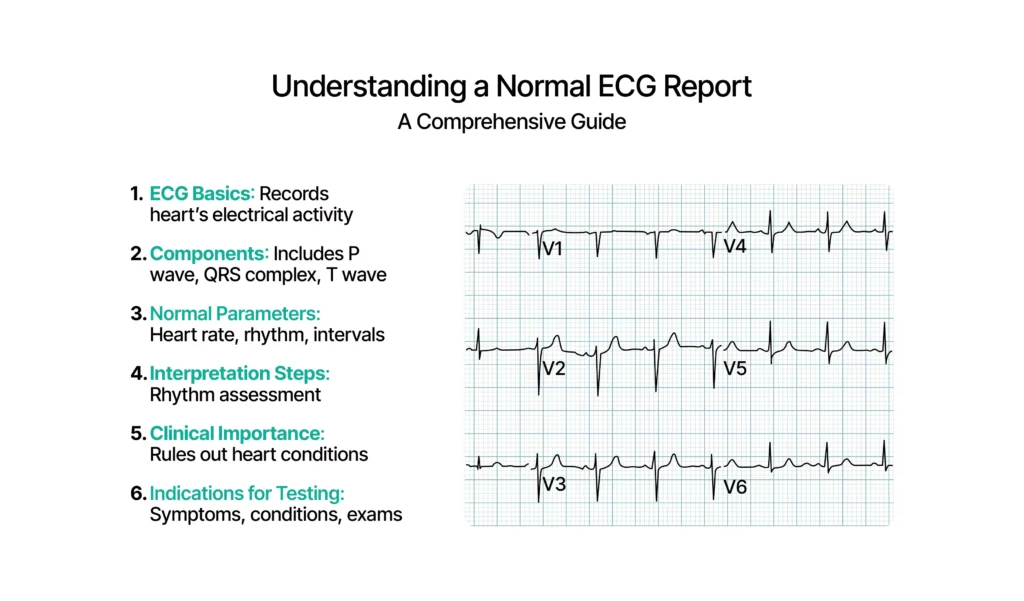Table of Contents
An ECG test Means a vital diagnostic tool that measures the electrical activity of your heart. If you’ve been recommended to undergo an ECG test, you might be wondering, “What does an ECG test mean?” Understanding the purpose and significance of this test can alleviate concerns and help you better navigate your heart health.
Whether you’re experiencing irregular heartbeats, chest pain, or fatigue, an ECG test provides invaluable insights into your heart’s rhythm and electrical function. This non-invasive procedure helps doctors detect heart conditions early, potentially saving lives by addressing issues before they become more severe.
What Does an ECG Test Means?
An ECG test is a quick, simple, and painless procedure that tracks the electrical signals of your heart. Electrodes are placed on your skin—typically on your chest, arms, and legs—where they record the electrical impulses generated by each heartbeat. The results are then displayed on a monitor as a series of waves, known as an electrocardiogram. These waves give doctors a detailed view of your heart’s rhythm, timing, and electrical activity.
An ECG test can help detect various heart conditions, including:
- Arrhythmias (irregular heartbeats)
- Heart attacks (both past and ongoing)
- Heart enlargement
- Coronary artery disease
- Electrolyte imbalances
- Congenital heart defects

Why Is an ECG Test Important for Your Health?
An ECG test provides critical information that can be used to prevent life-threatening conditions. Here’s why it’s so important:
1. Early Detection of Heart Issues
Many heart conditions develop without noticeable symptoms. An ECG test can identify these issues early, sometimes even before you experience any signs of a problem. Early intervention often leads to more effective treatment.
2. Monitoring Existing Heart Conditions
For individuals with known heart conditions, regular ECG tests help doctors monitor heart health and adjust treatment plans accordingly. It can also help in assessing how well treatments, such as medication or pacemakers, are working.
3. Assessing Heart Attack Risk
If you’ve had a heart attack, an ECG can identify previous damage to the heart muscle. It can also help doctors assess if you’re at risk of a future heart attack.
4. Determining the Cause of Symptoms
If you’re experiencing symptoms like chest pain, dizziness, or shortness of breath, an ECG can help determine whether your heart is the cause. This can guide your doctor toward the right treatment.
How Is an ECG Test Performed?
The ECG test is straightforward and typically completed in a medical office or hospital. Here’s what to expect:
- Preparation: You’ll be asked to remove any clothing above your waist to allow access to your chest and limbs. Depending on the location of the electrodes, you may also need to roll up your sleeves.
- Electrode Placement: Small electrodes are attached to your skin. These electrodes are connected to the ECG machine with wires, which record the electrical activity of your heart.
- Recording: You will be asked to lie still while the test is being performed. The procedure takes only about 5-10 minutes to complete. It’s painless and non-invasive, though some individuals may feel slightly uncomfortable with the adhesive on their skin.
- Results: Once the test is complete, the ECG results are immediately available. Your doctor will analyze the waveforms and share the findings with you.
What Can an ECG Test Reveal About Your Heart?
An ECG test provides detailed information about your heart’s electrical activity, and this data is crucial for diagnosing heart conditions. Here’s what an ECG can reveal:
- Heart Rate: The ECG measures how fast your heart is beating, helping doctors detect irregularities such as tachycardia (fast heart rate) or bradycardia (slow heart rate).
- Heart Rhythm: The test helps identify arrhythmias or irregular heartbeats, which can lead to complications like stroke or heart failure if untreated.
- Size of Heart Chambers: Changes in the electrical patterns can indicate enlargement of the heart or specific chambers, signaling potential heart disease or heart failure.
- Past Heart Attacks: An ECG test can show signs of damage from a previous heart attack by detecting abnormal wave patterns caused by scar tissue in the heart.
- Electrolyte Imbalances: The test can reveal abnormalities caused by an imbalance in minerals like potassium, calcium, or sodium, which are crucial for proper heart function.
When Should You Have an ECG Test?
An ECG test is often recommended if you have symptoms such as:

- Chest pain
- Shortness of breath
- Dizziness or fainting
- Irregular or rapid heartbeats
- Family history of heart disease
You may also need an ECG if you are undergoing surgery or certain medical treatments that could impact heart function.
What Happens After the ECG Test?
After the test, your doctor will discuss the results with you. If the ECG shows normal heart activity, you’ll likely be reassured and given advice on maintaining heart health. However, if abnormalities are detected, further tests may be recommended, such as an echocardiogram, stress test, or blood work, to better understand your heart health.
Common ECG Results and Their Meaning:
- Normal ECG: Your heart rhythm and activity are normal.
- Abnormal ECG: There could be signs of arrhythmias, heart attack damage, or other heart conditions.
Conclusion: Your Heart Health and the ECG Test
An ECG test is a crucial diagnostic tool that helps identify heart issues early, ensuring you receive timely treatment. Whether you’re monitoring an existing condition or seeking answers for unexplained symptoms, this simple test provides invaluable insights into your heart’s health. If you’ve been advised to undergo an ECG test, trust that it’s an essential step in keeping your heart in optimal condition.
Would you like to generate SEO-friendly titles and descriptions?
FAQs
1. What does an ECG test show?
An ECG test shows the electrical activity of your heart. It measures the timing and strength of the electrical signals that trigger each heartbeat. This helps doctors detect heart problems like arrhythmias, heart attacks, heart enlargement, and more.
2. Is an ECG test painful?
No, an ECG test is completely painless. Small electrodes are attached to your skin, and you simply lie still for a few minutes while the machine records your heart’s electrical activity. There is no discomfort involved in the procedure.
3. How long does an ECG test take?
An ECG test typically takes about 5 to 10 minutes. It’s a quick and simple procedure that can provide immediate results to your healthcare provider.
4. Do I need to prepare for an ECG test?
Preparation for an ECG test is minimal. You may be asked to remove any clothing from the waist up, as electrodes need to be attached to your chest, arms, and legs. It’s also best to avoid wearing lotions or oils on your skin, as they may interfere with electrode placement.
5. Can an ECG test detect a heart attack?
Yes, an ECG test can detect signs of a past heart attack and help identify ongoing heart attacks. It shows changes in the heart’s electrical patterns, which can indicate heart muscle damage caused by a heart attack.
Would you like to generate SEO-friendly titles and descriptions?
